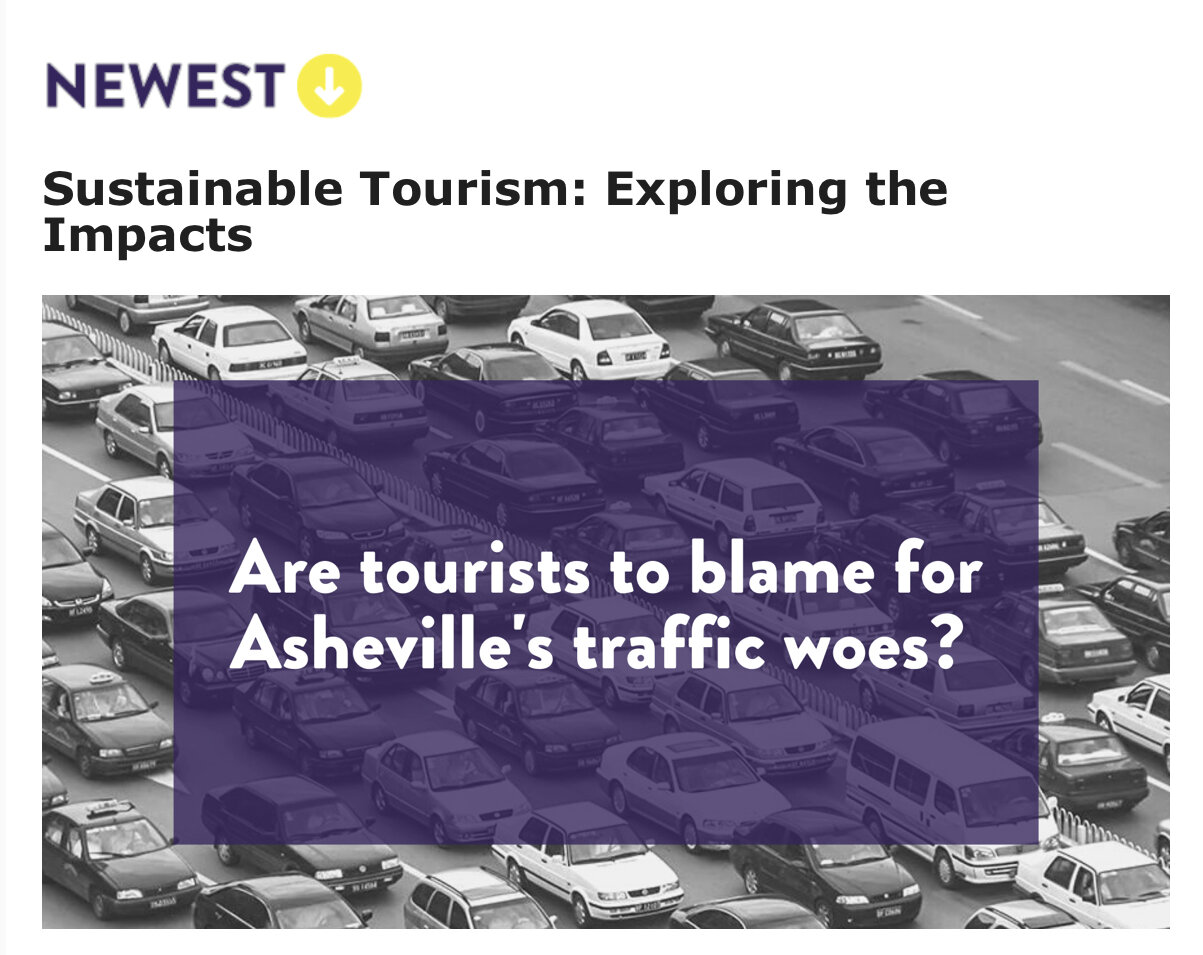August Newsletter: Exploring Tourism Impacts
While tourism has served as a pillar of Asheville’s local economy since the nineteenth century, it’s no secret that visitors and in-migration are testing the limits of the city’s infrastructure. In a 2019 survey on tourism impacts by the Buncombe County TDA, residents across the city and county cited traffic and parking needs as issues to be addressed.
But, we can’t pin all of Asheville’s problems on the bogeyman of tourism; the traffic that overwhelms the city’s streets and highways is created in large part by commuters. Of the area’s workers, 76% drive a single-occupancy vehicle to their place of work. More than 67,000 people commute to work in Asheville from surrounding areas each day, with an additional 22,000 residents commuting within city limits, and another 55,000 city and county residents commuting for purposes other than work. That's a total of 144,000 full-time residents on the road each day, according to Land of Sky Regional Council.
This fall, Thrive Asheville is bringing leaders together to explore how we can support a robust tourism sector, and protect our environment, and a high quality of life for all residents. When we look at the dual challenge of traffic and parking, maybe the question isn’t who is to blame — residents or tourists — but what we can do to make it better for everyone. What investments can be shared among public sources and the tourism sector to increase the ease with which residents and tourists move around our community?
Read the full blog here, and stay tuned to keep learning with us!
Join Thrive for MountainTrue's Building Our City Speaker Series on Wednesday, September 22!
Featuring Megan Epler Wood, this event will kick off Thrive's Ideas to Action Leadership Forum, a year-long community discussion on sustainable tourism. We envision a tourism sector that meets the triple bottom line of profitability, protection for the environment, and care for our people and our culture.
Megan Epler Wood is a thought leader, author, teacher, speaker, and consultant on questions of managing sustainable tourism for destinations and a founder of the field of ecotourism. From 2010-2021, her research and online courses at Harvard University vetted a wide range of solutions to help protect travel destinations. She leads sustainable travel research at Cornell’s Center for Sustainable Global Enterprise, and she has written two books on the subject: Sustainable Tourism on a Finite Planet and Destinations at Risk: The Invisible Burden of Tourism. She has delivered keynote speeches on her works around the world, including at the Banff Center, Canada; Copenhagen, Denmark; Stockholm, Sweden; Edinburgh, Scotland; and many other destinations on Zoom in 2020. Asheville, North Carolina will be her first in-person speech since the pandemic began.
Register to join us at the event here.
Thrive's Finding Home project included a panel discussion with local experts. Panelists from city government and local nonprofits offered perspectives on Asheville's affordable housing crisis and discussed creative solutions to increase the city's housing supply.
Watch this video from the event to learn more about the affordable housing issues we're up against, and how we can come together to combat them.
In early 2020, Asheville's real estate market was already red hot. But when COVID-19 reached the area, housing became even more competitive — and expensive.
“If your budget is $300,000 or lower, it is almost impossible to find anything,” says Alexandra Schrank, real estate agent with RE/MAX Executive. “We are seeing double-wide trailers selling for $250,000.”
What's to blame for the surge? In addition to the pandemic's lowered interest rates and slowed building activity, buyers fleeing larger urban markets contribute to Asheville's heightened home prices.
So what can we do locally to manage the impact? Scott Dedman of Mountain Housing Opportunities emphasizes the importance of building new housing as the city grows. “We live in a popular place, and many of us are here for the same reasons that newcomers are here," he says. "The question should be, are we working hard enough to meet the increasing demand with new housing supply?”
Read the full story from Mountain Xpress here.




